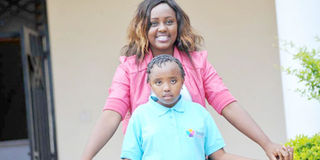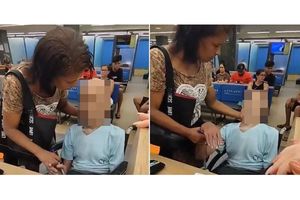Tale of courage : My daughter first called me mummy at eight

Nancy Kerubo and her daughter Natasha. PHOTO | COURTESY NMG
What you need to know:
- “Thankfully, after the many years of trying we were able to potty-train and she can finally go to the toilet by herself,” adds Kerubo, who had Natasha when she was 19.
Nancy Kerubo’s daughter, Natasha, called her mummy for the first time at eight years old. Natasha started eating hard foods at five. It was the same age that she stopped using diapers.
“Thankfully, after the many years of trying we were able to potty-train and she can finally go to the toilet by herself,” adds Kerubo, who had Natasha when she was 19.
It’s a journey that no one saw coming. As a toddler, Natasha Wangari had communication difficulties but it wasn’t well understood how things would go until she was much older. With age, she exhibited other odd behaviour such as withdrawal, obsession with sameness or fury at disruptions.
“You can’t tell that there is anything wrong just by looking at her but once you relate with her, you start to realise she is not your typical nine-year old.”
Natasha was one year and three months old when the parents started noticing something was amiss. She hit none of the milestones kids her age had.
Concerned, her parents sought a doctor’s intervention but upon examination, the baby was given a clean bill of health.
The doctor recommended a CT scan to check if the brain was fine. It was, and this threw the first-time parents into even more panic as they were still certain something was terribly wrong. It was not until the head teacher at the first school they enrolled her in Kahawa Wendani,-also concerned on noticing Natasha’s limited social skills and how she just sat alone while other kids played together-suggested that she sees an ENT specialist that they really got to confirm a fear Kerubo had had for some time.
“You know, with autistic children, you might easily assume they are deaf because when you call them they will normally not respond. Plus she was still not talking properly at three and half years. So we thought for sure it was a problem with her hearing,” she recalls.
After assessment, the ENT specialist confirmed Natasha’s hearing was okay.
But nothing could have prepared the mother for the heartbreaking news that came shortly after that.
After having a 30-min play session with Natasha, the doctor sat her down.
“She asked if I knew about autism. I was taken aback, even though by this time, I had started searching the internet for a possible explanation to her developmental delays and one of the results to have come up had been autism. I think I was just in denial.”
Her mother recalled that when she wanted to communicate, Natasha would flap her hands. The behaviour, a repetition of physical movements and soundscommon with autistic people because they can’t speak is called stimming. She would also tip toe.
Autism is a poorly-understood neurological disorder that manifests as an inability of an individual to engage in various social interactions.
Obtaining a diagnosis was a relief because it enabled Kerubo and her husband start studying and making effort to find out as much as she could about the condition, and make adjustments to their lives to accommodate their daughter’s disorder.
“It is not a disease, so it is not something you treat. You just manage it,” she interjects.
She is yet to do speech therapy. Her mother says finding a speech therapist in Kenya has proven to be a tough ordeal and the few in the country are very expensive.
For Natasha, linguistic ability is a skill best learnt from song lyrics.
“Listening to music is her favourite pastime. And having once heard a song she will never forget it, and will even go on the website to search for music trivia on it. Just so she can understand it further,” says Kerubo.
According to her mother, those around her realised that she was intrigued by music and rhythm at a very young age and seemed to have an especially remarkable memory for whatever song she had been listening to.
And so along with therapy her parents have introduced her to the piano. Her parents have also introduced her to the piano in order to nurture her musical skills.
“We are encouraging her to play the piano in line with this love for music. But we are trying other things as well. My internet research has told me that autistic individuals, if supported, do very well,” says Kerubo. Natasha has also taken well to swimming and is excellent at it, according to the mother.
The mother of three says she has always set small goals for her in an attempt to impart new life skills as they go along.
We have learned not to make plans for her, but to accompany her progress instead of mapping her life,” she says. She thinks of her daughter’s situation as, differently abled and doesn’t like the idea of her being called disabled.
She says her siblings, a set of twins now one year and four months, have helped her development milestones.
“I was worried when I gave birth to the twins because I thought she would sit on them or mishandle them. But she has been very good with them. If she finds them doing anything she wouldn’t approve of she will pick them and bring them back to me, The twins have helped her out in terms of developing her social skills, because of the level of interactions,” she says.
“I have taken to speaking openly about Natasha’s condition, anywhere I go with her…at the mall or supermarket even at the salon… to improve understanding of her behaviour, I talk about autism. You can imagine being with her and then she throws herself on the ground. I always make an effort to explain and people are always very understanding. Talking loudly about it has helped me accept it further. I feel this helps create general awareness too, but I didn’t ever try to hide her away from the world.”
But things haven’t always been rosy. There are times when she would just pick her daughter up and retreat to the comfort of their house after sensing rejection from others.
“When she was little, I worried about her little interest in interacting with others, including children of a similar age. I tried to help her by taking her outside to play with her peers, you know to see if the social skills would develop… but then I’d find that every time I took her to a group of kids, the parents came picking their kids one by one as if she wasn’t supposed to be there. It really demoralised me,” she recalls.
Kerubo says her and the husband had to put up with all sorts of negativity including that from close relatives.
“Things were said…ooh this isn’t from our side of the family ooh…I need to go to a certain witchdoctor, but my hubby and I have stood by each other all this time. If I had listened to all the things that were being said I don’t know if I would be where I am.”
“Today as a family we have fully accepted and continue to do what we can to improve Natasha’s life, but because we realise what a struggle it is finding support and institutions that are suitable for kids like her we started Feruzi Charter School in April this year,” she adds.
Do you have feedback on this story? Please e-mail: [email protected]




